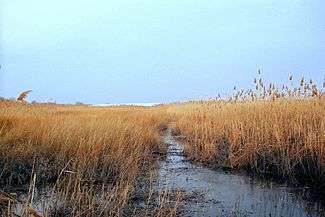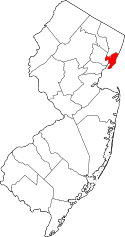West Hudson, New Jersey



West Hudson is the collective name of the municipalities of Kearny, Harrison and East Newark located west of the Hackensack River and east of the Passaic River in Hudson County in northeastern New Jersey. The Passaic River separates it from Newark and Belleville, and the Hackensack River separates it from Jersey City, the county seat. Residential districts are concentrated along the banks of the Passaic, while along the Hackensack there is more industry, brownfields, or protected areas of the New Jersey Meadowlands known as the Kearny Meadows or the Kearny Marsh[1]
The area was known as Meghgectecock (spellings include masgichteu-cunk) by the Lenape people who lived there at the time of European coloniazation, meaning where May-apples grow, from a moist-woodland perennial that bears edible yellow berries [2] and used to describe the lobe of land between and the confluence of the Hackensack and Passaic Rivers at Newark Bay.[3] (Contemporary: masgichteu meaning may apple [4])
It was part of the area called Achter Col by New Netherlanders in the province of New Netherland during the 17th century. It was later given the name New Barbadoes Neck by British colonialists, and was originally part of Essex County. In 1710 it was made part of New Barbadoes Township, and part of Bergen County. It became part of Hudson County formed in 1840.
Portion of the Morris Canal ran through Kearny Point, unused portions which remain today.[5] West Hudson is criscrossed with rail passenger and freight rail lines,[6][7] including those of Amtrak, New Jersey Transit, and PATH, the last of which maintains a station at Harrison, at the site of the former Manhattan Transfer. The Kearny Connection is a major rail junction. The proposed high-speed rail line known as the Gateway Project will traverse the area and includes the replacement of the Portal Bridge.
The West Hudson towns and Newark, particularly the Ironbound across the Passaic have had a long tradition of soccer.[8][9] Kearny's nickname, "Soccer Town, UUSA" comes from tradition that originated in the mid-1870s, when thousands of Scottish and Irish immigrants settled there after two Scottish companies, Clark Thread Company and Nairn Linoleum, opened..[10] The Newark Portuguese were one of the many teams.[9] The Red Bulls Stadium is in Harrison.
See also
- List of bridges, tunnels, and cuts in Hudson County, New Jersey
- Belleville Turnpike
- Gateway Region
- County Route 507 (New Jersey)
- County Route 508 (New Jersey)
- Kearny Connection
- North Hudson
- West Hudson A.A.
- New Jersey Meadowlands
- North Jersey Shared Assets Area
- Pulaski Skyway
Sources
- ↑ New Jersey Meadowlands Commission
- ↑ http://www.bergencountyhistory.org/Pages/indians.html Indigenous Population
- ↑ New Jersey Colonial Records, East Jersey Records: Part 1-Volume 21, Calendar of Records 1664-1702
- ↑ http://www.woodlandindians.org/forums/viewtopic.php?id=3749
- ↑ Kearny Yard
- ↑ http://www.portalbridgenec.com/pdfs/CD/Appendices/Appendix%20B%20-%20Historic%20Resources/B2%20Background%20History%20and%20Review%20of%20Previously%20Conducted%20Sur.pdf
- ↑ http://query.nytimes.com/mem/archive-free/pdf?res=F6061FF73F5911738DDDA80A94DD405B818CF1D3
- ↑ Allaw, Allaw . (2005). "Rangers, Rovers, And Spindles: Soccer, Immigration, And Textiles in New England and New Jersey". St Johann's Press.
- 1 2 Turnball, John (March 30, 2008). "Remembering New Jersey's immigrant soccer past". The Global Game. Retrieved 2013-12-17.
- ↑ Hernandez, Raymond. "World Cup Hits Home In Soccer Town, U.S.A." The New York Times June 26, 1994. Accessed September 12, 2013. "In a nation that has not yet shared the world's enthusiasm for soccer, Kearny (pronounced CAR-nee) is certainly an anomaly. The town has two local soccer historians. On Kearny Avenue, the main strip, a sign proclaims: 'Welcome to Kearny. Soccer Town, U.S.A.'"
Coordinates: 40°45′35″N 74°08′43″W / 40.7597°N 74.1454°W
